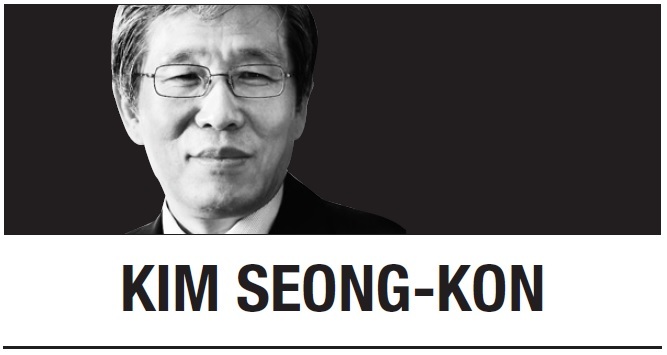[Kim Seong-kon] Twelve eerie stories that reflect our society
By Kim Seong-konPublished : Feb. 23, 2022 - 05:30

Part One unfolds with various bizarre stories that the protagonist, Seonnomi overheard from vendors who had dropped in for a drink or a one-night stay. Part Two introduces the Eerie Story Club created by Park Ji-won, a celebrated writer of superb satirical novels during the Joseon Dynasty. Park, who has dropped by the tavern with a friend, is delighted to discover Seonnomi’s talents as a storyteller and asks him to join the Eerie Story Club. The members of the Club decide to keep meeting at the tavern to hear uncanny stories from Seonnomi.
While reading the novel, I came to realize that the twelve supernatural stories in the book could each offer a poignant critique of our contemporary society. For example, “The Old Man Who Draws Portraits” solemnly warns that we should be very careful when we have an important choice to make, because there is no guarantee that our choice is always right. In the story, an old portrait artist warns the protagonist, who is confident in his ability to straighten out things, “Do you think your choice will always bring you the outcome as you have originally intended? If you do, you are wrong. We are merely puppets who mistakenly think that we can do something right.” Despite the warning, the young man insists that he can make things right. Due to his stubbornness, however, the young man ends up destroying not only himself, but also the woman he loves dearly. This story serves as an admonition to those who are prone to making hasty decisions and a stern response to today’s dogma-obsessed self-righteous Korean politicians.
“Return of the Dead Concubine” and “On His Way to Seoul for the Civil Service Exam” depict the evil cycle of political revenge, a true malady of our time. In “Return of the Dead Concubine,” a wife cruelly murders her husband’s concubine, together with her infant son, mistakenly believing that the concubine is responsible for her stillborn baby. After the incident, the wife gives birth to a living daughter. But when she looks at her daughter, she has a hallucination that she strikingly resembles the concubine. Driven to insanity, the wife kills her own daughter. These two grotesque stories present a warning that if we seek revenge, antagonizing our rivals, the retribution will come back to us like a boomerang.
“A Kidnapped Child” deals with a society of shamans who abduct children and starve them to death slowly in order to control their souls for evil purposes and monetary gain. This hair-raising story could be a metaphor for the way some radical teachers brainwash their young pupils with dogmatic ideologies these days. Meanwhile, “The Ghost Who Devours Children” powerfully indicts the child abuse that has become such a serious issue in our society lately.
“The Face behind the Mask,” too, portrays our society, where a global pandemic has caused everybody to wear a mask. In this story, when a person wears a sinister mask, his evil nature comes out and he does harm to people. Donning a mask, we can hide our identities, so we do evil things without shame. This macabre story could be a criticism of those who slander others maliciously on the internet, taking advantage of their anonymity.
“The Child Who Plays Marbles” criticizes corrupt politicians who take bribes and cover up the crimes of the wicked. In the story, the ghost of an orphan child, whose father is a victim of the corrupt political power, takes revenge upon the wicked perpetrators.
“Women’s Hair” admonishes our craze for physical beauty and those who do unethical things to make money by exploiting people’s vanity. It is deplorable that many young people these days shallowly value only physical beauty, not realizing the importance of inner beauty. Indeed, it is regrettable that plastic surgery is rampant in our society. It is also lamentable that so many highly esteemed professionals give up their artistic spirit and sell out for monetary gain.
The theme of “Secret Documents in Chunchu Gwan” is the responsibility of historians whose mission is to record history faithfully and warn political leaders of the grim future. In this story, some historians come to know the bleak future of their country, and yet they keep silent, fearing that it might cost their lives if they reveal the truth. Thus, they decide to keep the secret documents in the archive. This story recalls our present reality, where some of our historians discard their responsibilities and distort history to serve the ideology they blindly advocate.
The pleasure of reading “The Eerie Story Club at Samgae Tavern & Inn” comes from its powerful satirising of our present reality, which is as bizarre as the uncanny stories of the Joseon era. This remarkable historical novel mirrors the problems of our contemporary society, so that we can learn from the past how to overcome our present dilemmas.
Kim Seong-kon
Kim Seong-kon is a professor emeritus of English at Seoul National University and a visiting scholar at Dartmouth College. The views expressed here are his own. -- Ed.



![[AtoZ into Korean mind] Humor in Korea: Navigating the line between what's funny and not](http://res.heraldm.com/phpwas/restmb_idxmake.php?idx=644&simg=/content/image/2024/04/22/20240422050642_0.jpg&u=)
![[Exclusive] Korean military set to ban iPhones over 'security' concerns](http://res.heraldm.com/phpwas/restmb_idxmake.php?idx=644&simg=/content/image/2024/04/23/20240423050599_0.jpg&u=20240423183955)


![[Herald Interview] Why Toss invited hackers to penetrate its system](http://res.heraldm.com/phpwas/restmb_idxmake.php?idx=644&simg=/content/image/2024/04/22/20240422050569_0.jpg&u=20240422150649)
![[Graphic News] 77% of young Koreans still financially dependent](http://res.heraldm.com/phpwas/restmb_idxmake.php?idx=644&simg=/content/image/2024/04/22/20240422050762_0.gif&u=)






![[Exclusive] Korean military to ban iPhones over security issues](http://res.heraldm.com/phpwas/restmb_idxmake.php?idx=652&simg=/content/image/2024/04/23/20240423050599_0.jpg&u=20240423183955)



![[Today’s K-pop] Ateez confirms US tour details](http://res.heraldm.com/phpwas/restmb_idxmake.php?idx=642&simg=/content/image/2024/04/23/20240423050700_0.jpg&u=)